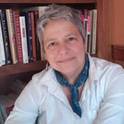
Article
Transcranial Magnetic Stimulation as a Complementary Treatment for Aphasia
Seminars in Speech and Language
(2004)
Abstract
Functional brain imaging with nonfluent aphasia patients has shown increased cortical activation (perhaps "overactivation") in right (R) hemisphere language homologues. These areas of overactivation may represent a maladaptive strategy that interferes with, rather than promotes, aphasia recovery. Repetitive transcranial magnetic stimulation (rTMS) is a painless, noninvasive procedure that utilizes magnetic fields to create electric currents in discrete brain areas affecting about a 1-cm square area of cortex. Slow frequency, 1 Hz rTMS reduces cortical excitability. When rTMS is applied to an appropriate cortical region, it may suppress the possible overactivation and thus modulate a distributed neural network for language. We provide information on rTMS and report preliminary results following rTMS application to R Broca's area (posterior, R pars triangularis) in four stroke patients with nonfluent aphasia (5-11 years after left hemisphere stroke). Following 10 rTMS treatments, significant improvement in naming pictures was observed. This form of rTMS may provide a novel, complementary treatment for aphasia.
Keywords
- Aphasia treatment,
- naming,
- transcranial magnetic stimulation
Disciplines
Publication Date
2004
Publisher Statement
Publisher's version is located at http://www.ncbi.nlm.nih.gov/pubmed/15118944
Citation Information
Jacquie Kurland. "Transcranial Magnetic Stimulation as a Complementary Treatment for Aphasia" Seminars in Speech and Language Iss. 25 (2004) Available at: http://works.bepress.com/jacquie_kurland/5/
